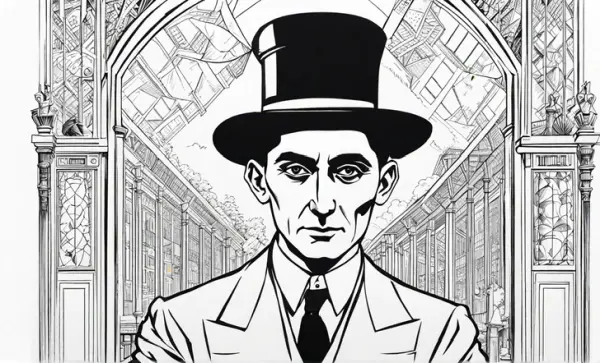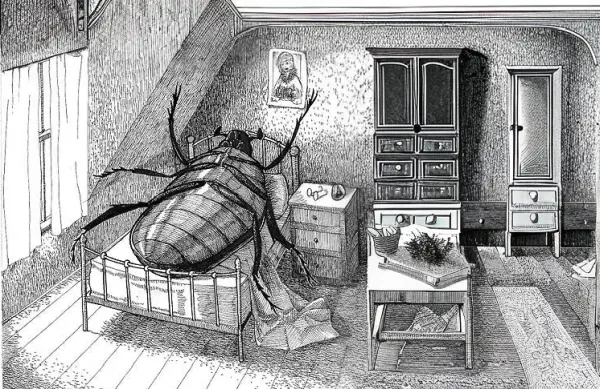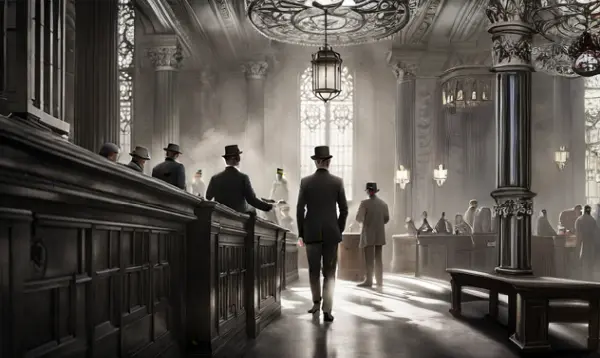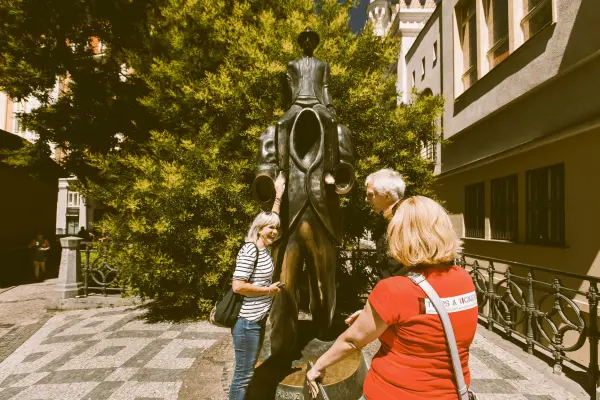Unveiling the Enigma: Franz Kafka’s Life and Legacy
It is a name synonymous with existentialism and surrealism, he is a literary enigma whose works have left an indelible mark on 20th-century literature. In this comprehensive exploration of Kafka’s life and literary legacy, we will delve into the intricate details of his early years, the key influences that shaped his writing, and the enduring impact of his works. Through the labyrinthine corridors of his novels and short stories, we will unravel Kafka’s unique worldview and the profound questions he posed about the human condition.

It is a name synonymous with existentialism and surrealism, he is a literary enigma whose works have left an indelible mark on 20th-century literature. In this comprehensive exploration of Kafka’s life and literary legacy, we will delve into the intricate details of his early years, the key influences that shaped his writing, and the enduring impact of his works. Through the labyrinthine corridors of his novels and short stories, we will unravel Kafka’s unique worldview and the profound questions he posed about the human condition.
Franz Kafka, a renowned literary figure, came into the world on July 3, 1883, in Prague, a bustling city that was then part of the Austro-Hungarian Empire. His birth into a middle-class Jewish family marked the beginning of a life that would ultimately leave an indelible mark on the world of literature. To truly understand the genesis of Kafka’s literary genius, one must immerse themselves in the vibrant cultural milieu of Prague during his formative years, which played a pivotal role in shaping his distinctive writing style and themes.

Early Life and Formative Year of Franz Kafka
Prague, at the turn of the 20th century, was a city teeming with intellectual fervour and artistic innovation. It served as a crucible for a multitude of cultural influences, seamlessly blending German, Czech, and Jewish traditions.
This eclectic mix of cultures and ideas created an environment where Kafka was exposed to a rich tapestry of experiences, each contributing to the intricate fabric of his literary world. The streets of Prague, with their architectural marvels and labyrinthine alleys, would later find their way into the surreal landscapes of his novels and short stories.
Kafka’s relationship with his father, Hermann Kafka, was a complex one, fraught with tensions and influences that would leave an indelible mark on his psyche. Hermann, a domineering and authoritarian figure, significantly shaped Kafka’s perception of authority and fatherhood, themes that would recur throughout his literary works.
The interplay between Kafka’s admiration for and rebellion against his father became a recurring motif in his exploration of power dynamics and the absurdity of human existence.
His impact on literature is indelibly marked by his distinctive writing style, a revolutionary departure from conventional literary norms of his time. His works are characterized by a surreal and allegorical nature that challenges readers to transcend the boundaries of reality. In this exploration, we delve into the profound literary techniques that Kafka expertly wielded to craft his unique narratives.

Kafka’s Writing Style and Themes
Kafka’s mastery of fables is a hallmark of his storytelling. His use of concise, allegorical tales within his larger narratives serves to convey complex philosophical ideas and existential dilemmas. These parables often function as enigmatic mirrors reflecting the absurdity of human existence. Analyzing Kafka’s lessons allows us to unravel the layers of meaning beneath his seemingly simple narratives.
Absurdity is a pervasive theme in Kafka’s works, echoing the anxieties and uncertainties of the modern era. His protagonists often find themselves caught in surreal and nightmarish situations, where the rational world disintegrates into the irrational. Kafka’s portrayal of the absurd challenges readers to confront the inherent absurdity of life itself, mirroring the disorientation experienced in a rapidly changing world.
Introspection is another vital element of Kafka’s writing style. His characters engage in deep self-reflection and introspective analysis, often revealing the fractured nature of their identities. This introspection invites readers to explore the inner workings of Kafka’s characters, who grapple with their own existential crises and wrestle with questions of identity and purpose.
“The Metamorphosis” is a literary masterpiece that serves as a quintessential exploration of existential themes. This iconic novella takes readers on a journey into the depths of the human psyche while delving into the surreal transformation of its protagonist, Gregor Samsa, into a grotesque insect-like creature. In this analysis, we will embark on an in-depth exploration of Kafka’s narrative, dissecting its layers of meaning and symbolism, and shedding light on the profound societal alienation that Gregor experiences.
Kafka’s masterful use of symbolism and allegory is on full display in “The Metamorphosis.” The symbolism of Gregor’s insect form, exploring how it represents the dehumanizing effects of modern capitalism.
Gregor’s transformation into a vermin mirrors the way individuals in a capitalist society can be reduced to mere commodities, stripped of their humanity and individuality. Kafka’s portrayal of Gregor’s family’s reactions, from initial shock to eventual neglect and exploitation, underscores the harsh realities of familial expectations and societal pressures.

Kafka’s The Trial: A Surreal Legal Drama
“The Trial” stands as a surreal and enigmatic exploration of the intricacies and absurdities of the modern legal system. In this intricate narrative, readers are introduced to the bewildering journey of Joseph K., a seemingly ordinary man who is suddenly arrested and thrust into a nightmarish web of bureaucracy and legal proceedings. As we delve into the heart of Kafka’s narrative, we uncover a multifaceted critique of authority, guilt, and the elusive quest for justice, all underpinned by the novel’s enduring ambiguity and open-ended conclusion.
Joseph K.’s arrest serves as the catalyst for Kafka’s piercing critique of authority. The shadowy and all-encompassing legal system that ensnares him becomes a metaphor for the arbitrary exercise of power in the modern world. We will explore how Kafka meticulously crafts a narrative where the faceless and often incomprehensible authority figures hold sway over Joseph K.’s life, pushing him deeper into a nightmarish labyrinth of procedures and hearings. Kafka’s portrayal of this pervasive and unaccountable authority raises profound questions about the individual’s relationship with power and the inherent vulnerability within a bureaucracy-driven society.
The elusive search for justice is at the core of the novel, with Joseph K. tirelessly seeking to comprehend the nature of his alleged crime and navigate the convoluted legal proceedings. Kafka’s portrayal of this relentless pursuit of justice underscores the inherent absurdity of the modern legal system, where the quest for truth becomes an elusive and surreal endeavor. We will examine how Kafka’s narrative raises questions about the possibility of genuine justice within a system characterized by ambiguity and arbitrariness.
The Unfinished Works of Franz Kafka
Franz Kafka’s literary legacy extends beyond his completed works, encompassing a treasure trove of unfinished and fragmented manuscripts that offer invaluable insights into his evolving literary ideas and narrative experiments. Among these fragments, three notable works stand out: “Amerika,” “The Man Who Disappeared” (later titled “Amerika”), and “The Nature Theater of Oklahoma.” In our exploration of these unfinished pieces, we will uncover their significance in shedding light on Kafka’s creative evolution and the rich tapestry of themes and ideas that occupied his mind.
“Amerika,” originally titled “Der Verschollene” (The Man Who Disappeared), is a novel that Kafka began but never completed. This narrative follows the adventures of Karl Roßmann, a young man sent to America by his family due to a scandalous affair. As we delve into this unfinished work, we will unravel its significance in illuminating Kafka’s fascination with themes of exile, displacement, and the pursuit of the American Dream. “Amerika” provides a unique lens through which we can explore Kafka’s exploration of the immigrant experience and the disorienting impact of an unfamiliar and sprawling landscape.
“The Man Who Disappeared” is an earlier version of “Amerika” that Kafka started working on before embarking on the more widely known version. Comparing the two versions allows us to trace Kafka’s creative process and witness the evolution of characters and plotlines. It offers a rare glimpse into the meticulous craftsmanship of a literary genius, highlighting the way Kafka honed his narrative skills and refined his storytelling techniques over time.
“The Nature Theater of Oklahoma” is another intriguing fragment in Kafka’s body of work. It takes the form of a letter from Kafka’s protagonist, K., addressed to his father. This fragment explores themes of familial relationships, communication, and the complex dynamics between fathers and sons. We will dissect this fragment’s significance in shedding light on Kafka’s personal struggles and his use of writing as a means of catharsis and self-expression. “The Nature Theater of Oklahoma” offers a glimpse into the emotional depth of Kafka’s literary endeavors and his ongoing exploration of the intricacies of human relationships.

Legacy and Influence of Franz Kafka
Franz Kafka’s enduring impact on literature and human thought transcends the boundaries of his lifetime, and much of his posthumous recognition can be attributed to the tireless efforts of his close friend and literary executor, Max Brod.
In this exploration, we will delve into the profound posthumous recognition of Kafka’s work and the pivotal role Max Brod played in bringing his unfinished manuscripts to the public eye. Additionally, we will examine how Kafka’s themes and literary techniques have left an indelible mark on subsequent generations of writers, philosophers, and filmmakers.
Max Brod, Kafka’s loyal friend and confidant, played a crucial role in preserving and publishing Kafka’s works after his death. Despite Kafka’s explicit request that his writings be destroyed, Brod defied this wish, recognizing the profound literary value of his friend’s creations.
Brod’s decision to safeguard Kafka’s manuscripts and publish them posthumously ensured that Kafka’s literary genius would not remain hidden but instead flourish on the world stage. We will explore the ethical and literary implications of Brod’s decision, which sparked enduring debates about the responsibilities of literary executors and the preservation of an author’s legacy.
Franz Kafka: The Enduring Enigma
Franz Kafka stands as an enigmatic and enduring figure in the world of literature, leaving an indelible mark on the literary landscape that continues to captivate and challenge readers worldwide. His exploration of existential themes, surreal narratives, and the depth of the human condition transcends time and place, offering a timeless source of contemplation and insight.
Kafka’s ability to delve into the inner recesses of the human psyche and lay bare the complexity of existence resonates with readers across generations. His narratives, often characterized by their dreamlike quality and allegorical nature, invite readers to embark on journeys of introspection and self-exploration. As we navigate the intricate labyrinths of his works, we find ourselves confronted with questions of identity, alienation, and the search for meaning in an increasingly complex world.
In the end, Franz Kafka’s legacy extends far beyond the confines of his era, offering a lasting appreciation for the enigmatic and thought-provoking dimensions of his literary creations. As we contemplate the mysteries woven into his narratives, we are reminded that literature has the power to transcend time and place, inviting us to grapple with the profound and enduring questions that define the human experience. Kafka remains an eternal source of wonder and a testament to the boundless possibilities of the written word.
Franz Kafka: FAQ
What were Franz Kafka’s favorite places in Prague?
Kafka spent most of his life in Prague, and the city influenced much of his work. Here are some of the places in Prague associated with Kafka:
- Kafka’s Birthplace: Kafka was born at the corner of Radnická and Kaprova Streets, near Old Town Square. The original building no longer stands, but there’s a plaque marking the spot.
- Kafka’s Family Home: Kafka’s family lived in a house on Wenceslas Square for a time. The exact address is Wenceslas Square 56.
- Kafka’s School: Kafka attended the German Gymnasium located in Old Town Square. This historic building still stands.
- Franz Kafka Museum: While this is a posthumous establishment and wasn’t a place Kafka frequented, it’s a place in Prague dedicated to his life and work. Located in Mala Strana (Lesser Town), it gives insights into Kafka’s relationship with the city.
- The House at the Golden Plough: Located on Celetná Street, this was another of Kafka’s residences.
- The House at Three Kings: Located in U Radnice Street, Kafka lived here from 1889 to 1896.
- Café Slavia: A favorite café of many Czech intellectuals and artists, it’s believed Kafka frequented this place with Max Brod and other friends. It’s located on the embankment of the River Vltava.
- The Jewish Quarter (Josefov): Kafka had a complex relationship with his Jewish heritage. The old synagogues, the Jewish Cemetery, and other sites in Josefov may provide insights into the Jewish influences in his work.
- Castle District (Hradčany): Kafka lived for a while in the Golden Lane (Zlatá ulička), near Prague Castle. The small and colorful houses in the Golden Lane are a tourist attraction today.
- Kafka’s Grave: He is buried at the New Jewish Cemetery in Prague’s Žižkov district.
These locations not only give a sense of Kafka’s day-to-day life but also provide insight into the maze-like streets and mysterious atmosphere of Prague that permeates his writing.
What was Franz Kafka’s favorite beer?
Franz Kafka’s favorite beer is unknown, but he was known to enjoy Czech beer. In his letters, he sometimes mentioned drinking beer with friends or family. For example, in a letter to his friend Max Brod in 1911, he wrote: “We went to the pub and drank beer until late into the night.”
It is possible that Kafka’s favorite beer was one of the many Czech beers that were available in Prague at the time. Some popular Czech beers from the early 1900s include Pilsner Urquell, Staropramen, and Budvar.
However, there is no definitive answer to the question of Franz Kafka’s favorite beer. Ultimately, it is a mystery that will never be solved.
Who was Franz Kafka?
Franz Kafka was a German-language Bohemian novelist and short-story writer based in Prague, who is widely regarded as one of the major figures of 20th-century literature. His work fuses elements of realism and the fantastic. It typically features isolated protagonists facing bizarre or surrealistic predicaments and incomprehensible socio-bureaucratic powers. It has been interpreted as exploring themes of alienation, existential anxiety, guilt, and absurdity. His best known works include the novella The Metamorphosis and novels The Trial and The Castle.
Kafka was born into a wealthy Jewish family in Prague, Austria-Hungary (now the Czech Republic) in 1883. He studied law at the University of Prague and worked as a lawyer for most of his life. He was a prolific writer, but he published very little during his lifetime. Most of his works were published posthumously by his friend Max Brod.
Kafka suffered from tuberculosis and died at the age of 40 in 1924. His work has been translated into over 100 languages and is read all over the world.
Kafka’s work is challenging and complex, but it is also deeply rewarding. His stories offer insights into the human condition that are both unsettling and thought-provoking.
Kafka’s work has been highly influential on modern literature and culture. The term “Kafkaesque” has come to be used to describe any situation that is absurd, nightmarish, or oppressive. His work has also been adapted into numerous films, plays, and operas.
Kafka is a complex and enigmatic figure, but his work continues to resonate with readers today. His stories offer a unique and unsettling perspective on the human condition, and they continue to challenge and provoke us.
What are his most famous works?
Some of Kafka’s most well-known works include “The Metamorphosis,” “The Trial,” “The Castle,” and “Amerika.”
Franz Kafka’s most famous works are:
- The Metamorphosis (1915)
- The Trial (1925)
- The Castle (1926)
- In the Penal Colony (1919)
- A Hunger Artist (1922)
- The Burrow (1923)
- A Country Doctor (1919)
These works are all considered to be masterpieces of modern literature, and they have been translated into over 100 languages. Kafka’s stories are known for their dark, nightmarish atmosphere, their exploration of themes such as alienation, guilt, and absurdity, and their complex and unforgettable characters.
The Metamorphosis is perhaps Kafka’s most famous work. It tells the story of Gregor Samsa, a young man who wakes up one morning to find himself transformed into a giant insect. The story is a dark and disturbing allegory of alienation and the loss of humanity.
The Trial is another of Kafka’s most famous works. It tells the story of Josef K., a man who is arrested and put on trial for a crime that is never revealed to him. The novel is a powerful exploration of the themes of guilt, bureaucracy, and the absurdity of modern life.
The Castle is Kafka’s unfinished final novel. It tells the story of K., a man who arrives in a village seeking to gain access to the castle that dominates the village. However, K. is unable to get permission to enter the castle, and he becomes trapped in a bureaucratic maze. The novel is a powerful exploration of the themes of alienation, power, and the futility of human striving.
What themes are prevalent in Kafka’s works?
The following themes are prevalent in Kafka’s works:
- Alienation: Kafka’s characters often feel isolated and alienated from the world around them. They may feel misunderstood, trapped, or powerless.
- Existential anxiety: Kafka’s work often explores the themes of meaninglessness and absurdity in life. His characters may struggle to find meaning and purpose in their existence.
- Guilt: Many of Kafka’s characters feel guilty about something, even if they are not sure what they have done wrong. This guilt can lead to self-doubt and despair.
- Absurdity: Kafka’s world is often Kafkaesque, meaning that it is absurd, nightmarish, and oppressive. His characters may face situations that are illogical and impossible to understand.
Other themes that are prevalent in Kafka’s works include:
- Bureaucracy: Kafka’s characters often find themselves trapped in bureaucratic labyrinths. They may be subjected to arbitrary rules and regulations, and they may be unable to get the help they need.
- Power: Kafka’s work often explores the dynamics of power and authority. His characters may be oppressed by powerful forces that they cannot control.
- Transformation: Kafka’s characters often undergo transformations, both physical and psychological. These transformations can be both positive and negative, and they can lead to insights into the human condition.
Kafka’s work is complex and challenging, but it is also deeply rewarding. His stories offer insights into the human condition that are both unsettling and thought-provoking.
Why is Kafka so important?
Kafka is important because his work explores universal themes that resonate with readers on a deep level. His characters are relatable, even though they are often trapped in strange and surreal situations. Kafka’s work also challenges readers to think about the world in new and different ways.
Some of the reasons why Kafka is so important include:
- His work explores universal themes. Kafka’s work explores themes such as alienation, existential anxiety, guilt, and absurdity. These are themes that all human beings can relate to, regardless of their background or circumstances.
- His characters are relatable. Kafka’s characters are often trapped in strange and surreal situations, but they are also relatable on a human level. Readers can identify with their struggles and their fears.
- His work challenges readers to think. Kafka’s work is not always easy to understand, but it is always thought-provoking. Kafka forces readers to question their own assumptions about the world and about themselves.
Kafka’s work has been highly influential on modern literature and culture. The term “Kafkaesque” has come to be used to describe any situation that is absurd, nightmarish, or oppressive. Kafka’s work has also been adapted into numerous films, plays, and operas.
Kafka is a complex and enigmatic figure, but his work continues to resonate with readers today. His stories offer a unique and unsettling perspective on the human condition, and they continue to challenge and provoke us.
In addition to the above, Kafka is also important because his work offers a unique perspective on the modern world. Kafka was writing at a time of great upheaval and uncertainty, and his work reflects this. Kafka’s characters often feel lost and powerless in a world that is increasingly complex and alienating. His work offers a valuable insight into the human experience in the modern world.
Kafka’s work is not for everyone. It is challenging and complex, but it is also deeply rewarding. His stories offer insights into the human condition that are both unsettling and thought-provoking. Kafka is a major figure in modern literature, and his work continues to be relevant today.
Why did Kafka ask for his works to be destroyed?
There are a few reasons why Kafka asked for his works to be destroyed after his death.
One reason is that Kafka was a perfectionist and he was often dissatisfied with his work. He felt that his writing was not good enough to be published, and he was afraid that it would be misunderstood.
Another reason is that Kafka was very private and he did not want his personal life to be made public. He felt that his writing was too personal and that it should not be shared with the world.
Finally, Kafka was also concerned about the political climate of his time. He lived during a time of great upheaval and uncertainty, and he was afraid that his work would be used for political purposes.
Despite Kafka’s wishes, his friend Max Brod published his work after his death. Kafka’s work has since been translated into over 100 languages and is read all over the world. Kafka is now considered one of the most important figures in modern literature.
It is important to note that there is no definitive answer to the question of why Kafka asked for his works to be destroyed. Kafka himself never explicitly stated his reasons, and there is no record of him discussing his wishes with anyone in detail. It is possible that Kafka’s reasons were a combination of the factors mentioned above, or that he had other reasons that he never shared with anyone.
Whatever his reasons, Kafka’s decision to ask for his works to be destroyed is a reminder of his perfectionism, his privacy, and his concern for the political climate of his time.
What style is Kafka known for?
Kafka is known for a unique blend of realism and the surreal, often presenting ordinary characters who face insurmountable challenges and bureaucratic nightmares. This style has given rise to the adjective “Kafkaesque,” used to describe situations or concepts reminiscent of his works, particularly the sense of helplessness in the face of an incomprehensible system.
What is The Metamorphosis about?
“The Metamorphosis” is a novella that tells the story of Gregor Samsa, a traveling salesman who wakes up one morning to find himself transformed into a monstrous insect-like creature. The story delves into the reactions of his family and the societal implications of such a transformation.
How has Kafka influenced modern literature?
Kafka’s influence on modern literature is profound. He has been a significant figure for existentialist, surrealist, and postmodern writers. The term “Kafkaesque” has become part of the English lexicon, reflecting his enduring influence on the way we conceptualize certain experiences and challenges.
Did Kafka ever win the Nobel Prize?
No, Franz Kafka never won the Nobel Prize in Literature, although his contribution to world literature is immense.
Why is Kafka’s personal life often discussed in relation to his work?
Kafka had a complicated relationship with his father, a topic he explored in his writings. His struggles with his health, his relationships with women, and his deep-seated feelings of guilt and anxiety have all been seen as significant influences on his work.
How did Kafka pass away?
Franz Kafka died from complications related to tuberculosis on June 3, 1924. He was 40 years old.